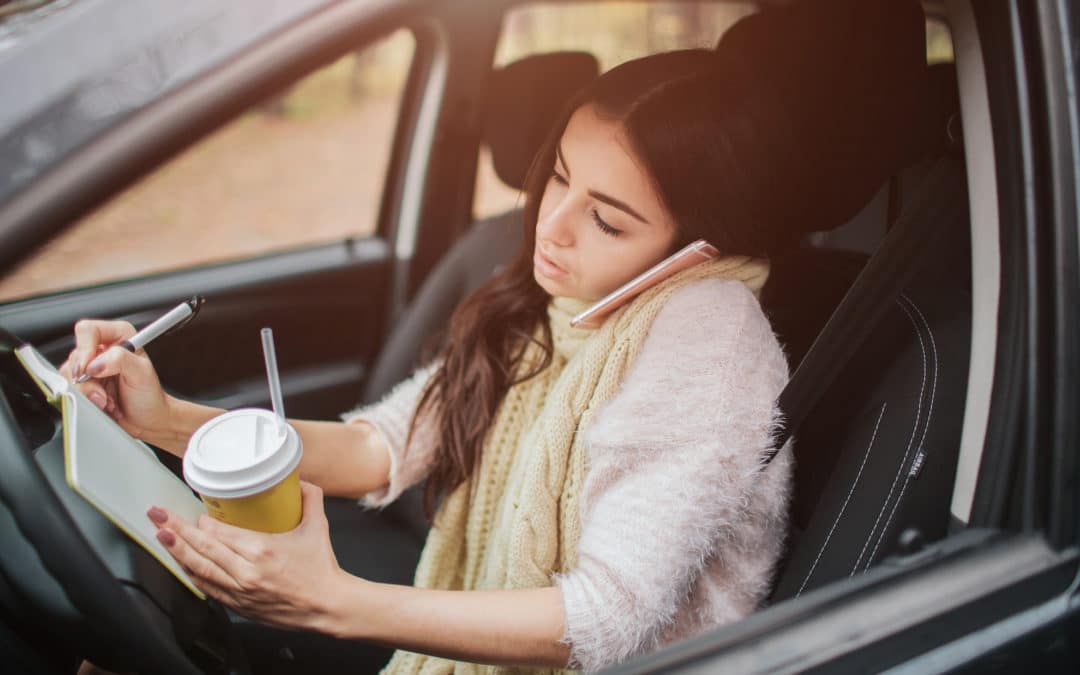Distracted Driving in the State of Florida
Distracted driving is a huge problem in Florida with the state ranking #3 on the list of states with the highest number of distracted drivers, according to a study done by safe-driving app Drivemode. Most people assume distracted driving is simply being on your phone when behind the wheel, but it includes a multitude of other things. Distracted driving is any activity that takes a driver’s attention away when behind the wheel. These activities include talking or texting on your phone, eating or drinking, messing with the radio or GPS, applying makeup, and even interacting with people or pets in the vehicle. While current state laws don’t prohibit all uses of handheld devices, distracted driving is never a good idea. Take a look at some of the statistics we found below.
- In 2017, nearly 50,000 car accidents were attributed to distracted driving in the state of Florida.
- Of those accidents, 4,000 included serious injuries, and 200 included wrongful deaths.
- Officials believe those number may be even higher as most drivers will not admit to being on their phone at the time of the accident.
- Nationally, 16% of all fatal car accidents are a result of distracted driving.
Understanding Florida Distracted Driving Laws
As mentioned before, not all uses of handheld devices are illegal in the state of Florida. Handheld devices can be used for navigation or communication as long as manual data entry is not required. This means that you are not allowed to type in addresses, send texts or emails, browse the internet, or instant message anyone when driving. You are, however, allowed to talk on the phone or look at it for GPS purposes, and while usage of a Bluetooth or other hands-free device it’s not required by law for the average motorist it is certainly recommended.
If you have a CDL and are driving a commercial vehicle, a hands-free component like a Bluetooth headset is mandatory if you need to talk on the phone for any reason.
If You’ve Broken the Law
In Florida, all distracted driving laws apply to people of all ages and there are no special laws regarding teenagers or members of the Graduates Licensing Program, so if you’re caught breaking the law the consequences will be the same across the board (for first-time offenders, anyway).
Texting and driving is considered a non-criminal offense, and drivers are charged with a nonmoving violation. Nonmoving violations are an offense that occurs when the vehicle is not in motion, but they can still result in points on your driving record and possible suspension of your license if there are repeated violations. You’ll receive a traffic ticket for the infraction in the amount of $30 (for your first offense), plus any court costs you may incur. Other possible penalties include a citation to appear before an official, 120 hours of community service (if the infraction results in the death of another individual), civil penalty fees, and court-ordered driver improvement school.
If you violate the law more than once in a 5-year period, you’ll receive what’s known as a moving violation. Moving violations are any traffic offense that occur while the vehicle is in motion. These types of violations (in addition to distracted driving) include driving faster or slower than the speed limit, running a red light or stop sign, not wearing a seatbelt, and DUI/DWI. If you’ve been ticketed for a moving violation, there are some hefty and long-term financial consequences. Fines can reach upwards of $500 depending on the infraction. Your insurance rates will also go up for each moving violation on your record and could amount to thousands of dollars each year. You’ll also accrue points on your license based on your offense and could ultimately have your license suspended or revoked.
Prevention is Key
The ultimate takeaway here is to follow the law and avoid driving while distracted whenever possible, and there are some easy ways you can do that. There are text-blocking apps that can be installed on your phone such as “It Can Wait” or AT&T Drivemode, or you can put your phone on silent or “do not disturb” mode so that you don’t get any notifications while driving. Some people even suggest placing your phone in the trunk or back seat so that you aren’t tempted to look at it at all. Pre-program your GPS before you start driving, and secure pets, children and any belongings near the back of the vehicle to reduce distractions while you’re behind the wheel.
While you can’t be control of other drivers, you can control your actions when on the road. Practicing safe and defensive driving is the best way to ensure the wellbeing of yourself, your passengers, and other motorists.
If you are injured in a car accident as a result of distracted driving, contacting The Armour Law Group, your Lake Nona personal injury lawyer, to investigate your case may be a good option. We may be able to help you obtain compensation for damage done to your vehicle and any injuries caused by the accident.


Recent Comments